 Source: JT Long of The Gold Report (11/10/14)
Source: JT Long of The Gold Report (11/10/14)
Frank Holmes’ advice to investors? Chill. In his interview with The Gold Report, the veteran 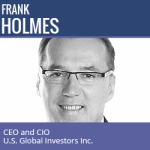 commodities investor shared some strategies that help him “sit back and stay balanced,” namely by diversifying and following the money. Find out about the indicators Holmes watches to read the market’s pulse, and why a +/- 35% move for gold doesn’t keep him awake at night. Holmes also profiles his favorite mining stocks, including one that generates what could be the highest per-employee revenue in the world.
commodities investor shared some strategies that help him “sit back and stay balanced,” namely by diversifying and following the money. Find out about the indicators Holmes watches to read the market’s pulse, and why a +/- 35% move for gold doesn’t keep him awake at night. Holmes also profiles his favorite mining stocks, including one that generates what could be the highest per-employee revenue in the world.
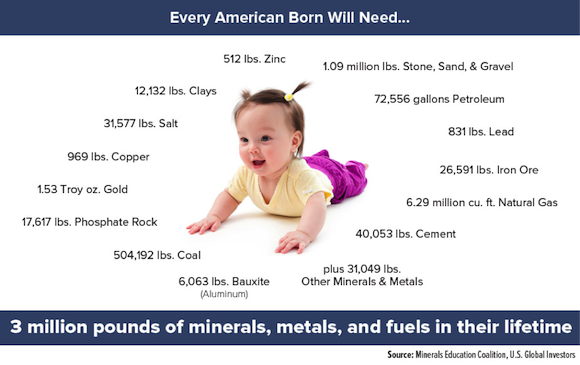
The Gold Report: Your talk at the New Orleans Investment Conference was titled “The Optimistic Investor in a Pessimistic World.” How do you stay so positive when gold falls 2% or even more in a day?
Frank Holmes: The biggest thing when it comes to gold—something I’ve always advocated—is to maintain a 10% weighting, 5% in gold stocks and 5% in gold jewelry or coins, and to rebalance each year. That has been a wonderful way for investors to deal with the volatility of the capital markets and to sleep at night.
TGR: What is happening in commodities? What are the most important indicators you’re watching?
FH: If you’re really in tune to the stock and commodity markets day in and day out, it’s kind of similar to arriving at a party and being able to tell if there is good energy or if it’s not the place for you. There are these patterns you notice.
“Klondex Mines Ltd. has done a great job of respecting value per share.“
When it comes to commodities, a magic number for looking toward the future is PMI, which stands for Purchasing Manufacturers Index. In America, it’s often called the ISM Manufacturing Index, which is exactly the same. J.P. Morgan publishes a global PMI every month, which surveys the major economies of the world, the G20 countries. I like to look at what happens when the one-month average of the world is above the three-month average, and what happens when it goes below. It’s remarkable to see the law of inertia take hold.
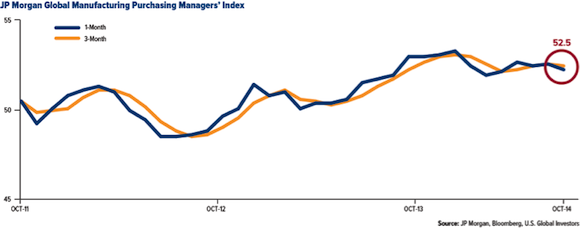
The global PMI was so very strong in 2003, 2004, 2005 and 2006. Europe, America and Asia were just roaring, and commodities were ripping. Since 2008, the patterns have changed. There are so many new fiscal rules, Federal Advisory Committee Act (FACA) rules, money movement rules, etc., that you can’t get the synchronized global PMI running in a very constructive way.
“MAG Silver Corp. has advanced the Juanicipio ramp to around 600m in length.“
But it’s important to look at what Europe is doing, because Europe is a bigger economic trading partner with China than America is. So when Europe slows down, that puts a real dent in China’s economic prosperity. But the real psychology in the stock market is Quantitative Easing 3 (QE3) ending.
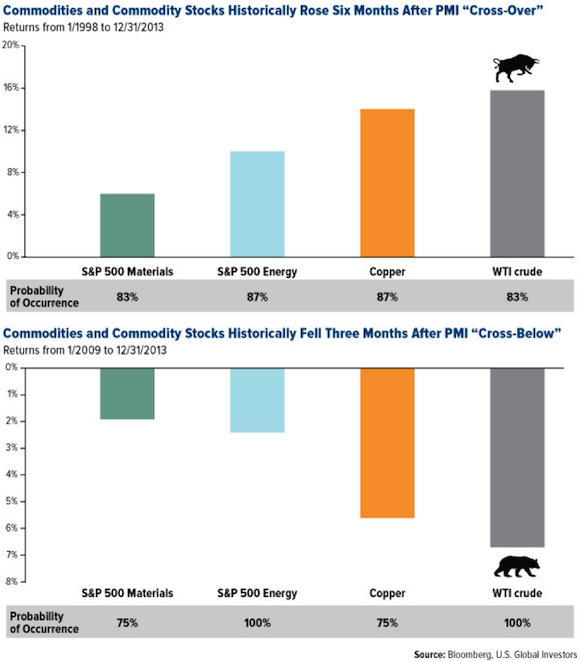
TGR: Do you think the headlines about ending QE3 are a short-term pain for the commodities market, particularly precious metals?
FH: The biggest thing that’s really hurting commodity markets, and gold in particular, is a stronger dollar. Whenever the real rates of return in America are negative, gold starts to rally, which it did for the first six months of this year. And now the rates have gone positive. So all of a sudden, gold starts taking it on the chin. But the positive note is that India has been buying gold and so has China—there has been record demand on the back of these selloffs. There is a slow tectonic shift taking place globally for this credible metal.
TGR: Let’s talk about how the fundamentals vary among asset classes and whether the volatility we’re seeing right now is normal.
FH: We did a special report in August/September, trying to explain this DNA of volatility. The piece was called “Managing Expectations: Anticipate Before You Participate.” Everything in life is about managing expectations. As Warren Buffett says, if you want to have a long-lasting marriage, have low expectations, and everything is on the upside. The same thing happens with earnings. Do you expect the PMI to be positive? Do you expect the earnings to be positive?
“Silver Wheaton Corp. is probably the most profitable company per employee in the world.“
What we have done in our research is look at all the asset classes, and we have noted that they each have different DNAs of volatility. When you look at gold and the stock market, it’s about the same. It’s a nonevent for gold to go +/-15%, and it’s normal for the S&P 500 to go +/-15%. But mining stocks, energy stocks, emerging markets and biotechnology have a DNA of volatility of +/-35%. If biotechnology is off 35%, it’s brutal feeling it as an investor, but it’s just normal. So right now, we have gold stocks off 35% over 12 months, and they’re down one standard deviation.
Now, if gold falls 50%, that means the odds favor a reversal. Last year at Christmastime, we commented that gold stocks and bullion were down two standard deviations, and we were due for a big rally. And positive interest rates went negative until June. Over those six months, gold rallied right back to its mean. Everything reverts to this mean average, which is important for investors to recognize. So when you’re looking at the volatility, it shouldn’t frighten you. The only time you really lose on this is if you’re forced out of a holding.
TGR: As we’re entering tax-loss selling season, what is your strategy for the end of the year?
FH: I look for companies that are trading way below their book value and are candidates to be taken out. When you go down the junior spectrum, the question is how much cash does a company have, and can it survive for two years without any funding. If not, then there is dilution risk. I try to stay away from the micro-cap stocks, which often spend money faster than they’re able to get their per-share reserves or production up.
TGR: You still have more than 80% of the Gold and Precious Metals Fund and more than 90% of the World Precious Minerals Fund in gold. What is your strategy there? What are your top performers?
FH: I think royalty companies are the safest plays—Franco-Nevada Corp. (FNV:TSX; FNV:NYSE) , Royal Gold Inc. (RGLD:NASDAQ; RGL:TSX) and Silver Wheaton Corp. (SLW:TSX; SLW:NYSE)—the three amigos. They have high-margin businesses and low cost of capital, and there are very smart people running these companies. When you take a look at a company like Silver Wheaton, 30 people are generating $500 million ($500M) in revenue. It’s probably the most profitable company per employee in the world.
TGR: And lower risk.
FH: Correct, much lower risk. Now, when it comes to the junior spectrum, we like the stock to have great management, have a wonderful footprint from a geological point of view, be increasing its production and be very conscientious of dilution. Klondex Mines Ltd. (KDX:TSX; KLNDF:OTCBB) is one of those companies that has done a great job of respecting value per share. When it comes to big caps, Randgold Resources Ltd. (GOLD:NASDAQ; RRS:LSE) is another company that’s conscientious about dilution and doing transactions that are extremely accretive.
TGR: Klondex just reported some drill results at Fire Creek. Have you been happy with the progress it’s making?
FH: Yes. We’re very happy with the company and management. It has a great track record. It has the sponsorship of Franco-Nevada. I think that’s an excellent company.
Another royalty company we have is Virginia Mines Inc. (VGQ:TSX). It has a big, healthy balance sheet, lots of cash and the ability to grow over time. I think that stocks like that will be rerated on any bounce in gold. They will bounce more than the Market Vectors Junior Gold Miners ETF (GDXJ:NYSE.MKT) will.
“Virginia Mines Inc. has a big, healthy balance sheet, lots of cash and the ability to grow over time.“
TGR: What silver companies in the fund are doing well?
FH: The silver companies are having a more and more difficult time. The safe play for silver is Silver Wheaton.
TGR: What about other companies active in Mexico?
Ralph Aldis: MAG Silver Corp. (MAG:TSX; MVG:NYSE) has been advancing the Juanicipio project in Mexico. From what I understand on the ramp development at Juanicipio, MAG Silver has advanced the ramp to around 600 meters in length. The development has been slower in the upper portion of the ramp due to the more weathered nature of the rock and the occasional intersection of silicified zones, which requires additional efforts to work through. Now MAG Silver is in more of the fresh volcanic rocks and advancing at about 115 meters per month. Currently it is about one-third through the estimated 30-month timeframe to reach the vein.
Fresnillo Plc (FRES:LSE), its partner, seems to be moving the process along at a “not-too-fast” rate. Fresnillo’s dilemma is that should it decide to buy out MAG Silver, it may have to pay a higher price once the Juanicipio is in production.
The bigger issue, which could potentially move the share price of MAG Silver higher in the near term, would be a resolution to access to the Cinco de Mayo Zn-Pb-Au-Ag carbonate replacement deposit, after being expelled by a more radical landowner group in the area. I believe MAG Silver is making progress on resolving this issue. Hopefully we will get a positive update in the first quarter next year.
TGR: Frank, you just won some awards for education. What is the role of education in your operation?
FH: My blog goes out to tens of thousands of people in 193 countries, so it’s amazing to see the readership. We’ve won about 64 awards in the past seven years. This year it was a record 10. The one that gets the No. 1 e-letter is Investor Alert. That is written every Friday night. Many publications can’t produce a product like this because compliance is so rigorous, but we are able to get it out to shareholders for the weekend read. It’s written by our investment team. It assesses the strengths and weaknesses of the portfolio, presents an outlook for the following week and notes major opportunities and threats. The SWOT model always has three sentences for each section and usually a chart. The fact that it’s put together by the investment team makes it much more credible and timely, but it’s also succinct.
TGR: Educate us. Give us something to be hopeful about.
FH: We’re seeing record numbers of companies buying back more than 4% of their stock every year. Apple announced a 20% buyback and increased its dividend. I’ll give you a good data point: Ten years ago, you bought your first iPod. Facebook was just being created. Today, 10 years later, Facebook does about $12 billion ($12B) in revenue, and the iTunes component of iPod does $18B in revenue. What Apple is doing is creating products that are synchronized together, sort of a holistic ecosystem. There is wonderful innovation in America. These things are important for overall growth in the economy.
Another positive note: There are lots of opportunities in basic materials and resources. While we’re talking, there are 7 billion people on Mother Earth. On the other side of the world, there are 100 million people having sex. And in nine months, there are going to be 1 million screaming babies, and that population growth is not going to stop.
TGR: And you have a great chart (see beginning of interview) that shows how many resources that baby will use over his or her lifecycle. What are some of the highlights on the commodity side?
FH: In 1972, China and India had no global footprint. They only had 2% of the world’s gross domestic product. Today, they’re 25% and 40% of the world’s population. Down the road, this is very positive for commodities. When these commodities turn and we finally get synchronized growth, then I think what’s going to happen is a streamlining of rules and regulations. Where you are getting the fastest growth is where there are tax breaks.
TGR: Do you think the results of the recent midterm elections will be positive for this regulatory environment?
FH: We’ll see what happens when it happens. The difficult part for the average investor is that the best the stock markets have been is with a Democratic president and a Republican Congress. That’s why we like to say that you should be diversified and follow the money. I’ve written about the fact that under Obama, there’s been a spectacular stock market run. It’s shocking. Why? Because so much capital has been injected into it. I think that one has to sit back and be balanced. One of the big things we told investors in New Orleans is that if you’re worried about all this volatility, then we have the no-drama fund, the Near-Term Tax Free Fund (NEARX). Morningstar has just given it a 5-Star Overall rating.
Investors age 50–55 are about 15 years away from retirement. It’s not a good time to take big risks like putting all assets in the stock market. Witness the huge crash of 2008 when individuals about to retire lost their nest eggs. When you compare the growth of the Near-Term Tax Free Fund over 13–14 years with the S&P 500, you can see that the fund has grown with relatively low risk. The stock market had a wild ride, but earned only a tiny bit more.
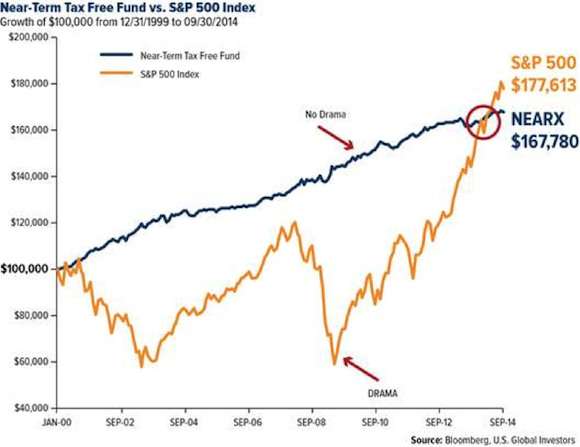
TGR: Thanks for talking with us.
FH: A pleasure, as always.
 Frank Holmes is CEO and chief investment officer at U.S. Global Investors Inc., which manages a diversified family of mutual funds and hedge funds specializing in natural resources, emerging markets and infrastructure. Holmes purchased a controlling interest in U.S. Global Investors in 1989 and became the firm’s chief investment officer in 1999. Under his guidance, the company’s funds have received numerous awards and honors including more than two dozen Lipper Fund Awards and certificates. In 2006, Holmes was selected mining fund manager of the year by the Mining Journal. He is also the co-author of “The Goldwatcher: Demystifying Gold Investing.” He is a member of the President’s Circle and on the investment committee of the International Crisis Group, which works to resolve global conflict, and is an adviser to the William J. Clinton Foundation on sustainable development in nations with resource-based economies. Holmes is a much sought-after keynote speaker at national and international investment conferences. He is also a regular commentator on the financial television networks CNBC, Bloomberg and Fox Business, and has been profiled by Fortune, Barron’s, The Financial Times and other publications.
Frank Holmes is CEO and chief investment officer at U.S. Global Investors Inc., which manages a diversified family of mutual funds and hedge funds specializing in natural resources, emerging markets and infrastructure. Holmes purchased a controlling interest in U.S. Global Investors in 1989 and became the firm’s chief investment officer in 1999. Under his guidance, the company’s funds have received numerous awards and honors including more than two dozen Lipper Fund Awards and certificates. In 2006, Holmes was selected mining fund manager of the year by the Mining Journal. He is also the co-author of “The Goldwatcher: Demystifying Gold Investing.” He is a member of the President’s Circle and on the investment committee of the International Crisis Group, which works to resolve global conflict, and is an adviser to the William J. Clinton Foundation on sustainable development in nations with resource-based economies. Holmes is a much sought-after keynote speaker at national and international investment conferences. He is also a regular commentator on the financial television networks CNBC, Bloomberg and Fox Business, and has been profiled by Fortune, Barron’s, The Financial Times and other publications.
Ralph Aldis, CFA, rejoined U.S. Global Investors as senior mining analyst in November 2001. He is responsible for analyzing gold and precious metals stocks for the World Precious Minerals Fund (UNWPX) and the Gold and Precious Metals Fund (USERX). Aldis also works with the portfolio management team of the Global Resources Fund (PSPFX) to provide tactical analyses of base metal, paper, chemical, steel and non-ferrous industries. Aldis received a master’s degree in energy and mineral resources from the University of Texas at Austin in 1988 and a Bachelor of Science in geology, cum laude, in 1981, from Stephen F. Austin University. Aldis is a member of the CFA Society of San Antonio.
Read what other experts are saying about:
Want to read more Gold Report interviews like this? Sign up for our free e-newsletter, and you’ll learn when new articles have been published. To see a list of recent interviews with industry analysts and commentators, visit our Streetwise Interviews page.
DISCLOSURE:
1) JT Long conducted this interview for Streetwise Reports LLC, publisher of The Gold Report, The Energy Report, The Life Sciences Report and The Mining Report, and provides services to Streetwise Reports as an independent contractor. She owns, or her family owns, shares of the following companies mentioned in this interview: None.
2) Frank Holmes: I own, or my family owns, shares of the following companies mentioned in this interview: None. I personally am, or my family is, paid by the following companies mentioned in this interview: None. The following companies mentioned in this interview are held in U.S. Global Investors funds: Apple, Franco-Nevada Corp, Klondex Mines Ltd, Randgold Resources Ltd, Royal Gold Inc, Silver Wheaton Corp, Virginia Mines Inc. and MAG Silver Corp. I was not paid by Streetwise Reports for participating in this interview. Comments and opinions expressed are my own comments and opinions. I determined and had final say over which companies would be included in the interview based on my research, understanding of the sector and interview theme. I had the opportunity to review the interview for accuracy as of the date of the interview and am responsible for the content of the interview.
3) Ralph Aldis: I own, or my family owns, shares of the following companies mentioned in this interview: None. I personally am, or my family is, paid by the following companies mentioned in this interview: None. The following companies mentioned in this interview are held in U.S. Global Investors funds: Apple, Franco-Nevada Corp, Klondex Mines Ltd, Randgold Resources Ltd, Royal Gold Inc, Silver Wheaton Corp, Virginia Mines Inc. and MAG Silver Corp. I was not paid by Streetwise Reports for participating in this interview. Comments and opinions expressed are my own comments and opinions. I determined and had final say over which companies would be included in the interview based on my research, understanding of the sector and interview theme. I had the opportunity to review the interview for accuracy as of the date of the interview and am responsible for the content of the interview.
4) The following companies mentioned in the interview are sponsors of Streetwise Reports: Silver Wheaton Corp., Virginia Mines Inc., MAG Silver Corp. and Klondex Mines Ltd. Franco-Nevada Corp. is not affiliated with Streetwise Reports. The companies mentioned in this interview were not involved in any aspect of the interview preparation or post-interview editing so the expert could speak independently about the sector. Streetwise Reports does not accept stock in exchange for its services.
5) Interviews are edited for clarity. Streetwise Reports does not make editorial comments or change experts’ statements without their consent.
6) The interview does not constitute investment advice. Each reader is encouraged to consult with his or her individual financial professional and any action a reader takes as a result of information presented here is his or her own responsibility. By opening this page, each reader accepts and agrees to Streetwise Reports’ terms of use and full legal disclaimer.
7) From time to time, Streetwise Reports LLC and its directors, officers, employees or members of their families, as well as persons interviewed for articles and interviews on the site, may have a long or short position in securities mentioned. Directors, officers, employees or members of their families are prohibited from making purchases and/or sales of those securities in the open market or otherwise during the up-to-four-week interval from the time of the interview until after it publishes.
Advertisement:
Join us at CommonStockWarrants.com for the only listing and details on all stock warrants trading in the United States and Canada. All industries and sectors are represented and many opportunites for investors. Don’t overlook this unique opportunity. Visit our website now.
